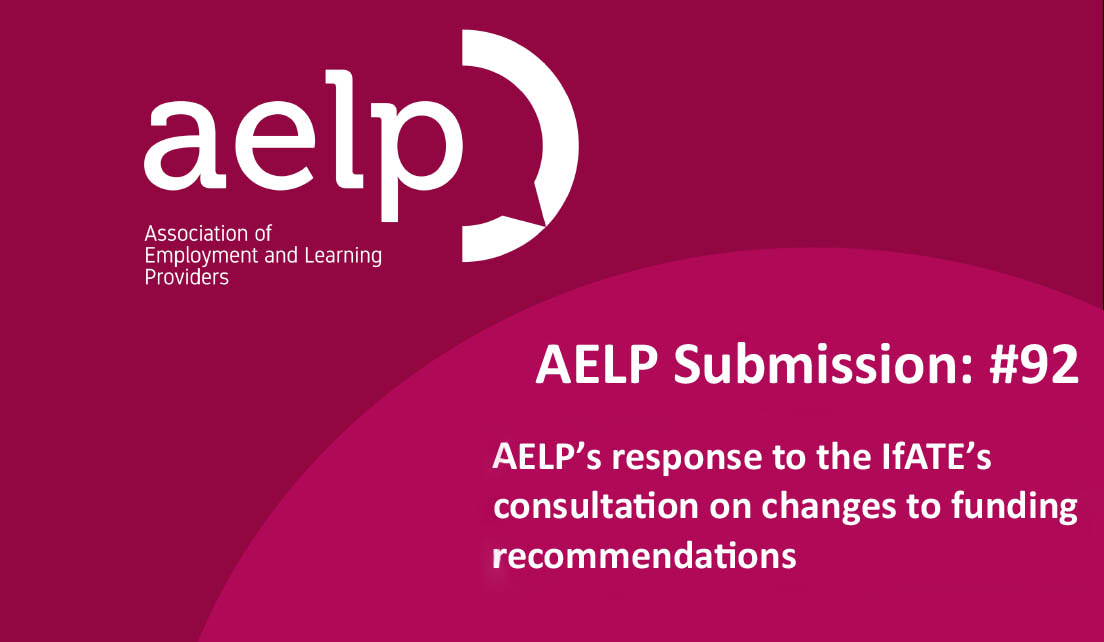Up to 45,000 apprentices and 5,000 adult education learners unable to progress before 2021

@AELPuk has written to the Apprenticeships and Skills Minister @GillianKeegan to voice concerns around functional skills testing and fair funding of apprenticeship standards.
The letter in full
Gillian Keegan MP
Parliamentary Under Secretary of State for Apprenticeships and Skills Department for Education
Sanctuary Buildings 20 Great Smith Street London
SWlP 3BT
06 October 2020
Dear Gillian,
The AELP Board met last week and in addition to the proposals included in AELP’s CSR submission, there were two major, including one very urgent, concerns about apprenticeships where your immediate attention is requested.
Testing for functional skills qualifications (FSQs)
Thousands of apprentices need the Department and Ofqual to change the policy on the conducting of functional skills assessments as soon as possible because the current position ls now causing a huge backlog for those waiting for their end point assessment.
Based on feedback from AELP member providers, as many as 75% of apprentices and adult learners could be affected by the decision to end Centre Assessed Grading (CAG) on 1 August which had been allowed for functional skills as part of the Covid flexibilities package for skills training. The 75% estimate is equivalent to 45,000 apprentices and 5,000 adult education learners being unable to progress between now and the end of December.
The ending of CAG is putting at disadvantage apprentices who cannot complete their apprenticeship as they are unable to take their functional skills test and enter End Point Assessment. Traditionally completion of their apprenticeship provides the apprentice with continuing security of employment, usually promotion and salary increase.
With increasing unemployment and competition in the jobs market, any apprentice made redundant without their qualification will be placed in a dreadful position. It is no wonder therefore that the press reports on this refer to considerable stress among apprentices.
Over the last month, AELP has had discussions with Ofqual, DfE, ESFA and IfATE on this matter and our understanding is that the position on CAG will not change without ministerial directive. In addition to the points made to the officials, we should stress:
- Those apprentices on legacy functional skills must be assessed by the end of October or fail and must start over again, which most won’t.
- The myth that software is available for learners to take their functional skills tests remotely; only two smaller awarding bodies offer this and they only service a very small percentage of all learners, leaving the remaining disadvantaged because their employer or training provider chose another awarding
- Even with remote software becoming available from other AOs, at the present time with training providers forbidden to enter employers’ premises, it presumes the learner will have a suitable laptop (a high spec is needed for this software) available at home, which many thousands of apprentices don’t have.
All sectors are affected but the Government should be particularly mindful of the significant impact that the hold-up is having on hospitality, the NHS and adult care as coronavirus restrictions remain.
We cannot emphasise enough how important this matter is in terms of allowing apprentices to progress and secure their jobs. Therefore I urge you to recommend to Ofqual as soon as possible that centre assessed grading should be permitted again and the practice should remain in place at least until April 2021.
Fair funding of apprenticeship standards
You will recall that the Commons Education Committee concluded ln one of its inquiries on apprenticeships that high quality programmes cannot be delivered on the cheap. With this in mind, the AELP Board has discussed our response to the latest lfATE consultation on apprenticeship funding bands.
Some colleagues find it hard not to believe that lfATE are under instruction to secure an overall reduction in the funding of standards and that the Institute is therefore looking for ways of ‘working backwards’ to achieve this. True or not, certainly the proposed exclusion of ‘ineligible costs’ from the calculation of the prescribed 9% margin, when these costs account for an estimated 22% of apprenticeship delivery, is causing considerable concern among providers and we were hearing for example that training electrical apprentices up to level 4 may become simply unviable. Surely the Government would want to avoid this when freedom of movement is about to end?
In summary, AELP’s concerns about lfATE’s latest funding model are:
- The 22% of a provider’s cost identified by lfATE’s commissioned research is not accounted for, despite it covering activity mandated by the ESFA rules alongside the cost of training
- The complete lack of recognition of any level of general operating overhead costs that all provider types need to cover to offer an apprenticeship
- The current long-standing issue of some apprenticeship standards that are not currently adequately funded enough to be delivered in a high quality and compliant manner and the impact on the two points above on these and all apprenticeship programmes – adult care at level 2 and 3 being obvious examples.
With apprenticeship starts 60% down on a year ago, now is not the time to squeeze the programme further in its ability to support employers and young people as part of the economic recovery.
The ESFA are not about to change their mandated requirements which come with a cost and therefore we ask that you discuss this matter with ESFA and lfATE with a view that the Institute will not finalise a funding band model which will lead to high quality providers withdrawing from the apprenticeship programme.
Martin Dunford and I are happy to discuss these two very important issues with you at any time. Yours sincerely,
Jane Hickie, Managing Director, Association of Employment and Learning Providers (AELP)











Responses